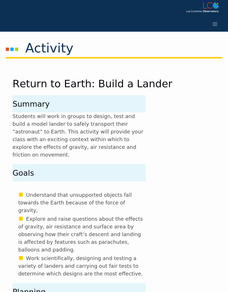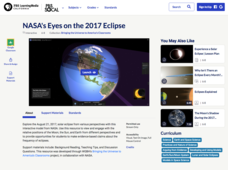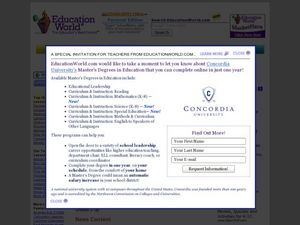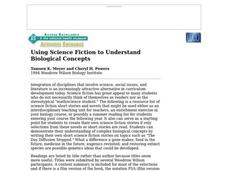Association of American Geographers
Project GeoSTART
Investigate the fascinating, yet terrifying phenomenon of hurricanes from the safety of your classroom using this earth science unit. Focusing on developing young scientists' spacial thinking skills, these lessons engage learners in...
Messenger Education
Cooling with Sunshades
Messenger's sun shade measures 8 ft x 6 ft and will have temperatures reaching 700 degree Fahrenheit on the outside while maintaining a cool 70 degrees underneath. In the third activity of four, groups discuss the basic properties of...
Baylor College
Your Energy Needs (BMR)
How many Calories one needs on a daily basis is dependent on a number of factors including gender, height, and activity level. In the third of seven lessons about energy and food, young nutritionists calculate the number of Calories...
PBS
The Planets of the Solar System
Launch a lesson that's sure to capture middle schoolers' interest! Exploration enthusiasts examine the planets of our solar system using an activity from PBS's Space series. The resource includes images and information for each planet,...
Las Cumbres Observatory
Return to Earth: Build a Lander
Earth to all instructors: Here's a resource to use about spacecraft. After learning about gravity and air resistance, scholars create landers with padding to help capsules land safely on Earth. They test their creations by placing a raw...
Baylor College
Bio Build-up
Trace pollutants through the environment in the seventh lesson of this series on the science of food. Looking at a picture of the plants and animals in an aquatic ecosystem, learners use dot stickers to represent harmful chemicals as...
Core Knowledge Foundation
A Time for All Seasons - Spring
Celebrate the arrival of spring with this fun primary grade science unit. Engaging young scientists with a variety of hands-on activities and inquiry-based investigations, these lessons are a great way to teach children about seasonal...
National Wildlife Federation
Massive Migrations
Turn your learners into flocks of migratory birds for this fun lesson on animal migration. Prior to the activity, the teacher creates four different migration routes in the classroom or any available open space, labeling nesting...
Core Knowledge Foundation
Rocks & Minerals
Take young geologists on an exploration of the rock cycle with this six-lesson earth science unit on rocks and minerals. Through a series of discussions, demonstrations, and hands-on investigations your class will learn about the...
Colorado State University
How Can I Turn a Solar Oven into a Refrigerator?
Whether you want to heat things up in science class or cool things down a bit, an intriguing lab's got you covered! Science scholars explore the principles of thermodynamics using a solar oven, then change the conditions to turn their...
National Park Service
Living & Non-Living Interactions
What better way to learn about ecosystems than by getting outside and observing them first hand? Accompanying a field trip to a local park or outdoor space, this series of collaborative activities engages children in learning about the...
Center for Math and Science Education
Pocket Solar System
How in the world can something as big as the solar system possibly fit in your pocket? Complete this simple modeling activity and find out, as young scientists gain an appreciation for the incredible scale of outer space.
PBS
NASA's Eyes on the 2017 Eclipse
How did the 2017 eclipse look in Los Angeles—or Chicago? Experience both views, plus many more, using a lesson from PBS's Space series for middle schoolers. Scholars follow the movements of the sun, moon, and Earth during the most recent...
North Carolina Museum of Natural Sciences
Weather Watch Activity Guide: Groundhog Day
Exactly what do groundhogs know about weather? Not as much as your science students will after completing these lessons and activities that cover everything from the earth's rotation and the creation of shadows, to cloud...
Scholastic
Lesson One: The Earth, Background and Glossary
How much do you really know about our planet? Middle schoolers build up their prior knowledge about Earth, its placement in the solar system, its composition, and important geological vocabulary with an introductory earth science lesson...
Curated OER
Teacher-Astronaut Offers New Lessons
Students read about teacher-in-space Barbara Morgan and life in space. In this space science and current event lesson, the teacher introduces the article with a vocabulary activity, then students read the news piece and participate in a...
Teach Engineering
Six Minutes of Terror
Help your class understand the design challenges when trying to land a remote spacecraft on a planet. Class members examine the provided information to understand how each component of a spacecraft is designed in order to safely land a...
Curated OER
Science Questions
Explore the concept of generating questions. Your curious learners choose a scientific question from a bowl and, as they listen to an article being read, they use that question starter to come up with their own questions. Then, they have...
Messenger Education
Star Power! Discovering the Power of Sunlight
It takes less than 10 minutes for energy from the sun to travel 90 million miles to Earth! In the first installment in a series of four, groups measure the amount of solar radiation that reaches Earth. They then discuss how this is...
Curated OER
Using Science Fiction To Understand Biological Concepts
Students read and discuss," The Andromeda Strain" by Michael Crichton and complete a short writing exercise as a warm-up for a longer piece of science fiction writing. They choose a topic and create a science fiction short story such...
Teach Engineering
Get Me Off This Planet
What do Newton's Laws have to do with getting from Earth to Mars?The activities in this resource show how Newton's Laws work with rockets to get them into space. Background information includes facts about orbits and how orbits are used...
Desert Discoveries
What's In A Habitat?
The concept of a habitat being a home for animals is the main thrust of this life sciences resource. Learners complete a cut-and-paste activity using a fine worksheet that's embedded in the plan. They must place four very different...
NASA
Two Versions of Gravity: Newton and Einstein
We have all heard the debate about teaching both theories, but an innovative lesson takes the discussion to a new level. Scholars research and debate Newton's Law of Gravitation versus Einstein's General Theory of Relativity with...
Teach Engineering
Manned Mission to Mars
To go or to not to go — the question for a mission to Mars. This resource provides details for a possible manned mission to Mars. Details include a launch schedule, what life would be like on the surface, and how the astronauts would...
Other popular searches
- Space Science
- Astronomy and Space Science
- Physical Science Space
- Earth and Space Science
- Science Space Experiment
- Space Science Vocabulary
- Science Space Lessons
- Space Science Astronomy
- Science Space Race
- Star Maps Science Space
- Earth Space Science
- Science Space Station

























